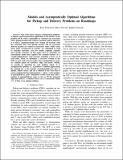| dc.contributor.author | Treleaven, Kyle | |
| dc.contributor.author | Pavone, Marco | |
| dc.contributor.author | Frazzoli, Emilio | |
| dc.date.accessioned | 2013-10-25T16:27:41Z | |
| dc.date.available | 2013-10-25T16:27:41Z | |
| dc.date.issued | 2012-12 | |
| dc.identifier.isbn | 978-1-4673-2066-5 | |
| dc.identifier.isbn | 978-1-4673-2065-8 | |
| dc.identifier.isbn | 978-1-4673-2063-4 | |
| dc.identifier.isbn | 978-1-4673-2064-1 | |
| dc.identifier.uri | http://hdl.handle.net/1721.1/81779 | |
| dc.description.abstract | One of the most common combinatorial problems in logistics and transportation-after the Traveling Salesman Problem-is the Stacker Crane Problem (SCP), where commodities or customers are associated each with a pickup location and a delivery location, and the objective is to find a minimum-length tour `picking up' and `delivering' all items, while ensuring the number of items on-board never exceeds a given capacity. While vastly many SCPs encountered in practice are embedded in road or road-like networks, very few studies explicitly consider such environments. In this paper, first, we formulate an environment model capturing the essential features of a “small-neighborhood” road network, along with models for omni-directional vehicles and directed vehicles. Then, we formulate a stochastic version of the unit-capacity SCP, on our road network model, where pickup/delivery sites are random points along segments of the network. Our main contribution is a polynomial-time algorithm for the problem that is asymptotically constant-factor; i.e., it produces a solution no worse than κ+o(1) times the length of the optimal one, where o(1) goes to zero as the number of items grows large, almost surely. The constant κ is at most 3, and for omni-directional vehicles it is provably 1, i.e., optimal. Simulations show that with a number of pickup/delivery pairs as low as 50, the proposed algorithm delivers a solution whose cost is consistently within 10% of that of an optimal solution. | en_US |
| dc.description.sponsorship | Singapore-MIT Alliance for Research and Technology Center | en_US |
| dc.language.iso | en_US | |
| dc.publisher | Institute of Electrical and Electronics Engineers (IEEE) | en_US |
| dc.relation.isversionof | http://dx.doi.org/10.1109/CDC.2012.6426164 | en_US |
| dc.rights | Creative Commons Attribution-Noncommercial-Share Alike 3.0 | en_US |
| dc.rights.uri | http://creativecommons.org/licenses/by-nc-sa/3.0/ | en_US |
| dc.source | Other univ. web domain | en_US |
| dc.title | Models and asymptotically optimal algorithms for pickup and delivery problems on roadmaps | en_US |
| dc.title.alternative | Models and efficient algorithms for pickup and delivery problems on roadmaps | en_US |
| dc.type | Article | en_US |
| dc.identifier.citation | Treleaven, Kyle, Marco Pavone, and Emilio Frazzoli. “Models and efficient algorithms for pickup and delivery problems on roadmaps.” In 2012 IEEE 51st IEEE Conference on Decision and Control (CDC), 5691-5698. Institute of Electrical and Electronics Engineers, 2012. | en_US |
| dc.contributor.department | Massachusetts Institute of Technology. Laboratory for Information and Decision Systems | |
| dc.contributor.department | Massachusetts Institute of Technology. Department of Aeronautics and Astronautics | |
| dc.relation.journal | Proceedings of the 2012 IEEE 51st IEEE Conference on Decision and Control (CDC) | en_US |
| dc.eprint.version | Author's final manuscript | en_US |
| dc.type.uri | http://purl.org/eprint/type/ConferencePaper | en_US |
| eprint.status | http://purl.org/eprint/status/NonPeerReviewed | en_US |
| dspace.orderedauthors | Treleaven, Kyle; Pavone, Marco; Frazzoli, Emilio | en_US |
| mit.license | OPEN_ACCESS_POLICY | en_US |
| mit.metadata.status | Complete | |
